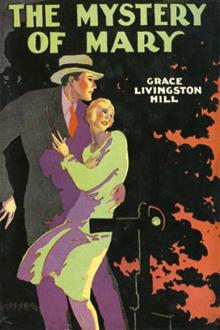The Mystery of Mary - Grace Livingston Hill (reading tree txt) 📗

- Author: Grace Livingston Hill
- Performer: -
Book online «The Mystery of Mary - Grace Livingston Hill (reading tree txt) 📗». Author Grace Livingston Hill
The Project Gutenberg EBook of The Mystery of Mary, by Grace Livingston Hill
This eBook is for the use of anyone anywhere at no cost and with
almost no restrictions whatsoever. You may copy it, give it away or
re-use it under the terms of the Project Gutenberg License included
with this eBook or online at www.gutenberg.net
Title: The Mystery of Mary
Author: Grace Livingston Hill
Release Date: January 7, 2005 [EBook #14632]
[Date last updated: January 15, 2005]
Language: English
*** START OF THIS PROJECT GUTENBERG EBOOK THE MYSTERY OF MARY ***
Produced by Charles Aldarondo, Emmy and the PG Online Distributed
Proofreading Team
THE MYSTERY OF MARY BY GRACE LIVINGSTON HILL LUTZ
AUTHOR OF
MARCIA SCHUYLER, PHOEBE DEANE, ETC.
FRONTISPIECE BY
ANNA W. SPEAKMAN
Emblem
GROSSET & DUNLAP
PUBLISHERS NEW YORK
Made in the United States of America
COPYRIGHT, 1910, BY J.B. LIPPINCOTT COMPANY
COPYRIGHT, 1912, BY J.B. LIPPINCOTT COMPANY
CONTENTSTHEY STRUGGLED UP, SCARCELY PAUSING FOR BREATH
THEY STRUGGLED UP, SCARCELY PAUSING FOR BREATH
Page 8
He paused on the platform and glanced at his watch. The train on which he had just arrived was late. It hurried away from the station, and was swallowed up in the blackness of the tunnel, as if it knew its own shortcomings and wished to make up for them.
It was five minutes of six, and as the young man looked back at the long flight of steps that led to the bridge across the tracks, a delicate pencilling of electric light flashed into outline against the city's deepening dusk, emphasizing the lateness of the hour. He had a dinner engagement at seven, and it was yet some distance to his home, where a rapid toilet must be made if he were to arrive on time.
The stairway was long, and there were many people thronging it. A shorter cut led down along the tracks under the bridge, and up the grassy embankment. It would bring him a whole block nearer home, and a line of cabs was standing over at the corner just above the bridge. It was against the rules to walk beside the tracks—there was a large sign to that effect in front of him—but it would save five minutes. He scanned the platform hastily to see if any officials were in sight, then bolted down the darkening tracks.
Under the centre of the bridge a slight noise behind him, as of soft, hurrying footsteps, caught his attention, and a woman's voice broke upon his startled senses.
"Please don't stop, nor look around," it said, and the owner caught up with him now in the shadow. "But will you kindly let me walk beside you for a moment, till you can show me how to get out of this dreadful place? I am very much frightened, and I'm afraid I shall be followed. Will you tell me where I can go to hide?"
After an instant's astonished pause, he obeyed her and kept on, making room for her to walk beside him, while he took the place next to the tracks. He was aware, too, of the low rumble of a train, coming from the mouth of the tunnel.
His companion had gasped for breath, but began again in a tone of apology:
"I saw you were a gentleman, and I didn't know what to do. I thought you would help me to get somewhere quickly."
Just then the fiery eye of the oncoming train burst from the tunnel ahead. Instinctively, the young man caught his companion's arm and drew her forward to the embankment beyond the bridge, holding her, startled and trembling, as the screaming train tore past them.
The pent black smoke from the tunnel rolled in a thick cloud about them, stifling them. The girl, dazed with the roar and blinded by the smoke, could only cling to her protector. For an instant they felt as if they were about to be drawn into the awful power of the rushing monster. Then it had passed, and a roar of silence followed, as if they were suddenly plunged into a vacuum. Gradually the noises of the world began again: the rumble of a trolley-car on the bridge; the "honk-honk" of an automobile; the cry of a newsboy. Slowly their breath and their senses came back.
The man's first thought was to get out of the cut before another train should come. He grasped his companion's arm and started up the steep embankment, realizing as he did so that the wrist he held was slender, and that the sleeve which covered it was of the finest cloth.
They struggled up, scarcely pausing for breath. The steps at the side of the bridge, made for the convenience of railroad hands, were out of the question, for they were at a dizzy height, and hung unevenly over the yawning pit where trains shot constantly back and forth.
As they emerged from the dark, the man saw that his companion was a young and beautiful woman, and that she wore a light cloth gown, with neither hat nor gloves.
At the top of the embankment they paused, and the girl, with her hand at her throat, looked backward with a shudder. She seemed like a young bird that could scarcely tell which way to fly.
Without an instant's hesitation, the young man raised his hand and hailed a four-wheeler across the street.
"Come this way, quick!" he urged, helping her in. He gave the driver his home address and stepped in after her. Then, turning, he faced his companion, and was suddenly keenly aware of the strange situation in which he had placed himself.
"Can you tell me what is the matter," he asked, "and where you would like to go?"
The girl had scarcely recovered breath from the long climb and the fright, and she answered him in broken phrases.
"No, I cannot tell you what is the matter"—she paused and looked at him, with a sudden comprehension of what he might be thinking about her—"but—there is nothing—that is—I have done nothing wrong—" She paused again and looked up with eyes whose clear depths, he felt, could hide no guile.
"Of course," he murmured with decision, and then wondered why he felt so sure about it.
"Thank you," she said. Then, with frightened perplexity: "I don't know where to go. I never was in this city before. If you will kindly tell me how to get somewhere—suppose to a railroad station—and yet—no, I have no money—and"—then with a sudden little movement of dismay—"and I have no hat! Oh!"
The young man felt a strong desire to shield this girl so unexpectedly thrown on his mercy. Yet vague fears hovered about the margin of his judgment. Perhaps she was a thief or an adventuress. It might be that he ought to let her get out of the odd situation she appeared to be in, as best she might. Yet even as the thought flashed through his mind he seemed to hear an echo of her words, "I saw you were a gentleman," and he felt incapable of betraying her trust in him.
The girl was speaking again: "But I must not trouble you any more. You have been very kind to get me out of that dreadful place. If you will just stop the carriage and let me out, I am sure I can take care of myself."
"I could not think of letting you get out here alone. If you are in danger, I will help you." The warmth of his own words startled him. He knew he ought to be more cautious with a stranger, but impetuously he threw caution to the winds. "If you would just tell me a little bit about it, so that I should know what I ought to do for you——"
"Oh, I must not tell you! I couldn't!" said the girl, her hand fluttering up to her heart, as if to hold its wild beating from stifling her. "I am sorry to have involved you for a moment in this. Please let me out here. I am not frightened, now that I got away from that terrible tunnel. I was afraid I might have to go in there alone, for I didn't see any way to get up the bank, and I couldn't go back."
"I am glad I happened to be there," breathed the young man fervently. "It would have been dangerous for you to enter that tunnel. It runs an entire block. You would probably have been killed."
The girl shut her eyes and pressed her fingers to them. In the light of the street lamps, he saw that she was very white, and also that there were jewels flashing from the rings on her fingers. It was apparent that she was a lady of wealth and refinement. What could have brought her to this pass?
The carriage came to a sudden stop, and, looking out, he saw they had reached his home. A new alarm seized him as the girl moved as if to get out. His dignified mother and his fastidious sister were probably not in, but if by any chance they should not have left the house, what would they think if they saw a strange, hatless young woman descend from the carriage with him? Moreover, what would the butler think?
"Excuse me," he said, "but, really, there are reasons why I shouldn't like you to get out of the carriage just here. Suppose you sit still until I come out. I have a dinner engagement and must make a few changes in my dress, but it will take me only a few minutes. You are in no danger, and I will take you to some place of safety. I will try to think what to do while I am gone. On no account get out of the carriage. It would make the driver suspicious, you know. If you are really followed, he will let no one disturb you in the carriage, of course. Don't distress yourself. I'll hurry. Can you give me the address of any friend to whom I might 'phone or telegraph?"
She shook her head and there was a glitter of tears in her eyes as she replied:
"No, I know of no one in the city who could help me."
"I will help you, then," he said with sudden resolve, and in a tone that would be a comfort to any woman in distress.
His tone and the look of respectful kindliness he gave her kept the girl in the carriage until his return, although in her fear and sudden distrust of all the world, she thought more than once of attempting to slip away. Yet without money, and in a costume which could but lay her open to suspicion, what was she to do? Where was she to go?
As the young man let himself into his home with his latch-key, he heard the butler's well trained voice answering the telephone. "Yes, ma'am; this is Mrs. Dunham's residence.... No, ma'am, she is not at home.... No, ma'am, Miss Dunham is out also.... Mr. Dunham? Just wait a moment, please I think Mr. Dunham has just come in. Who shall I say wishes to speak to him?... Mrs. Parker Bowman?... Yes, ma'am; just wait a minute, please. I'll call Mr. Dunham."
The young man frowned. Another interruption! And Miss Bowman! It was at her house that he was to dine. What could the woman want? Surely it was not so late that she was looking him up. But perhaps something had happened, and she was calling off her dinner.





Comments (0)